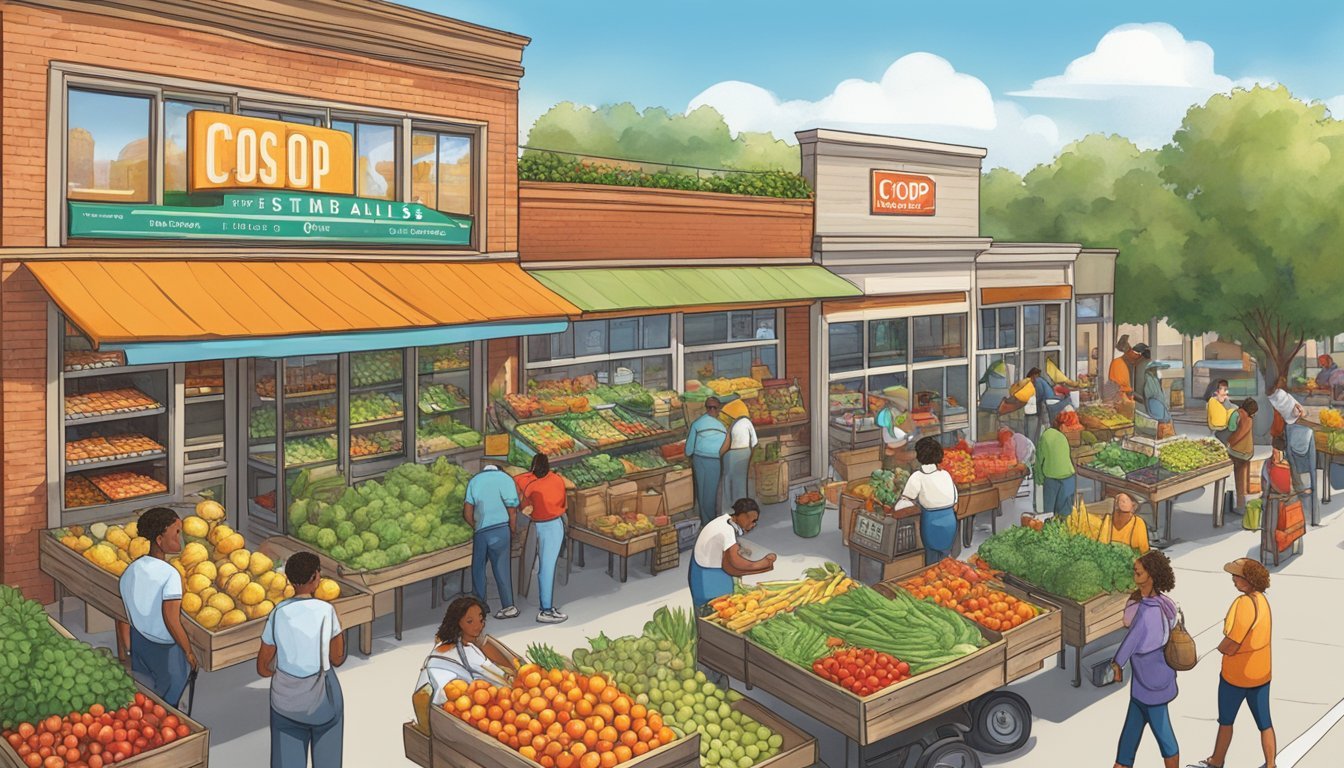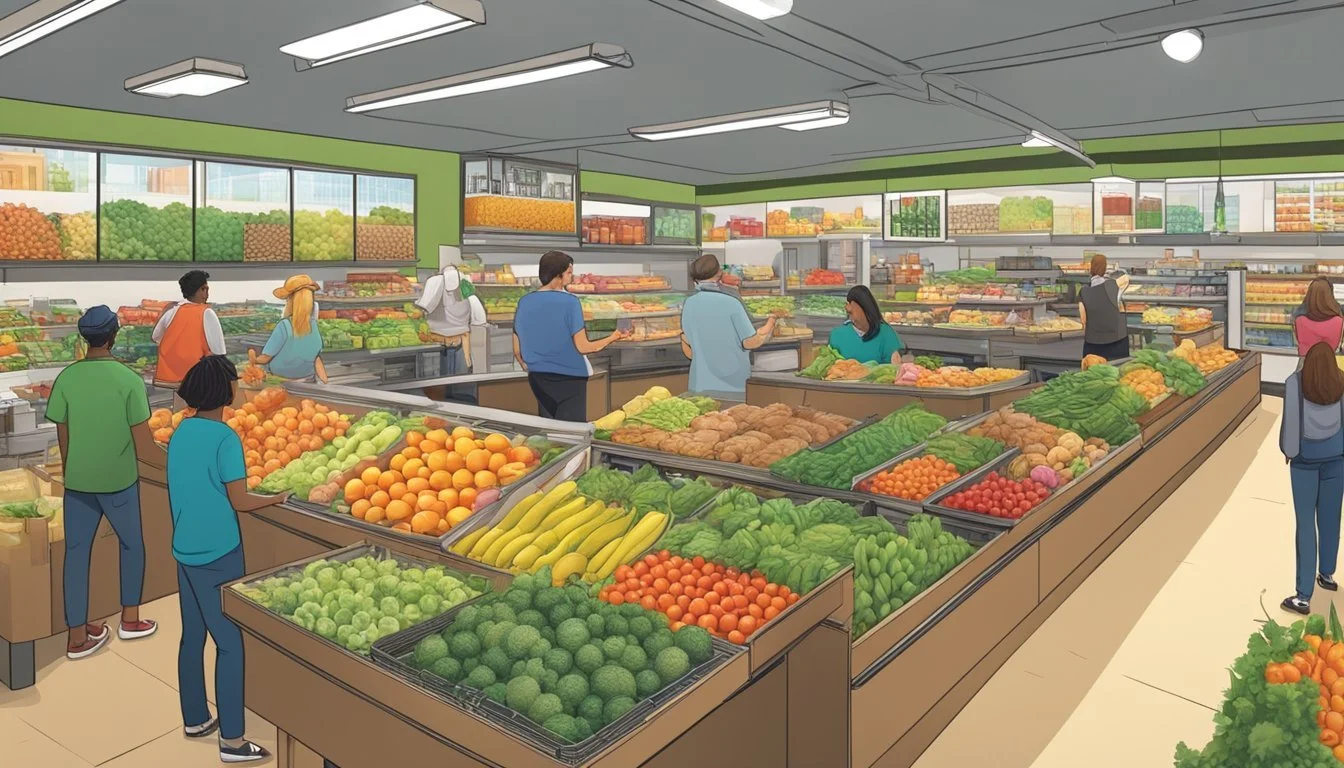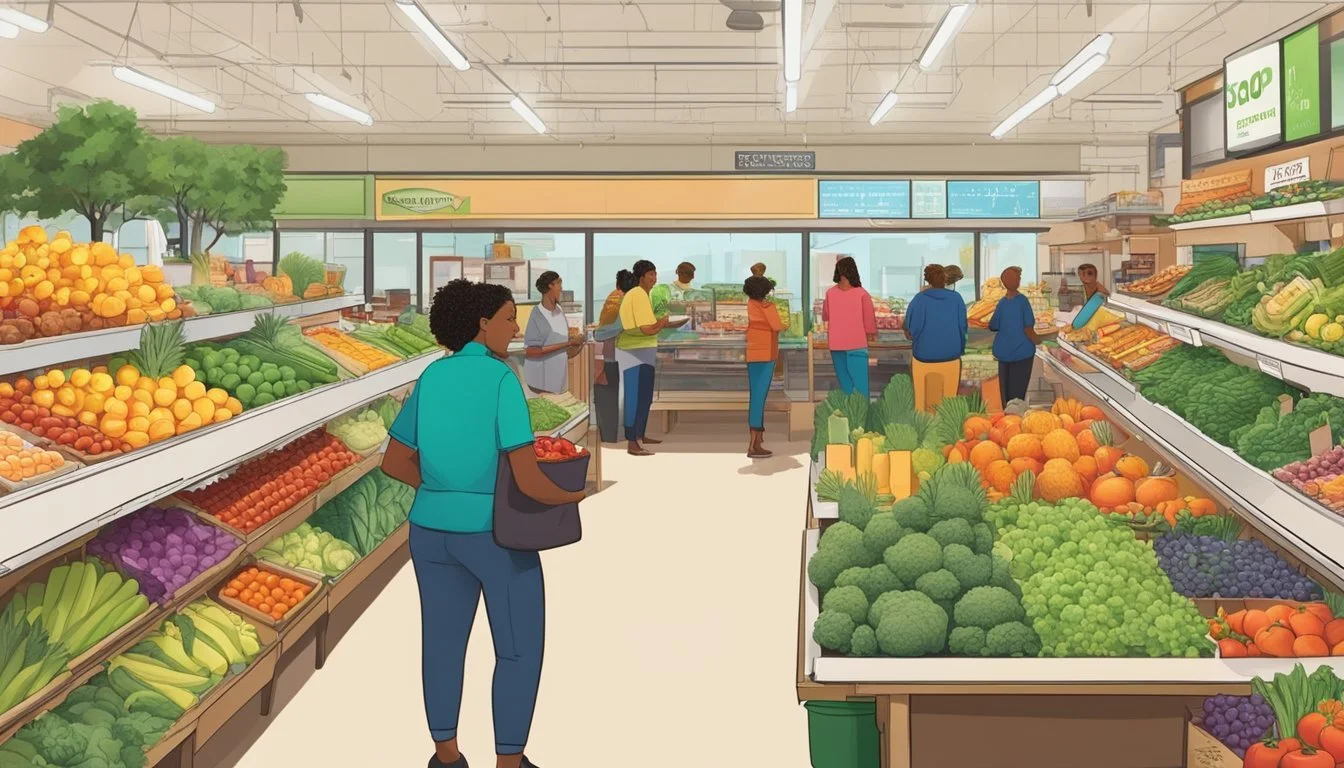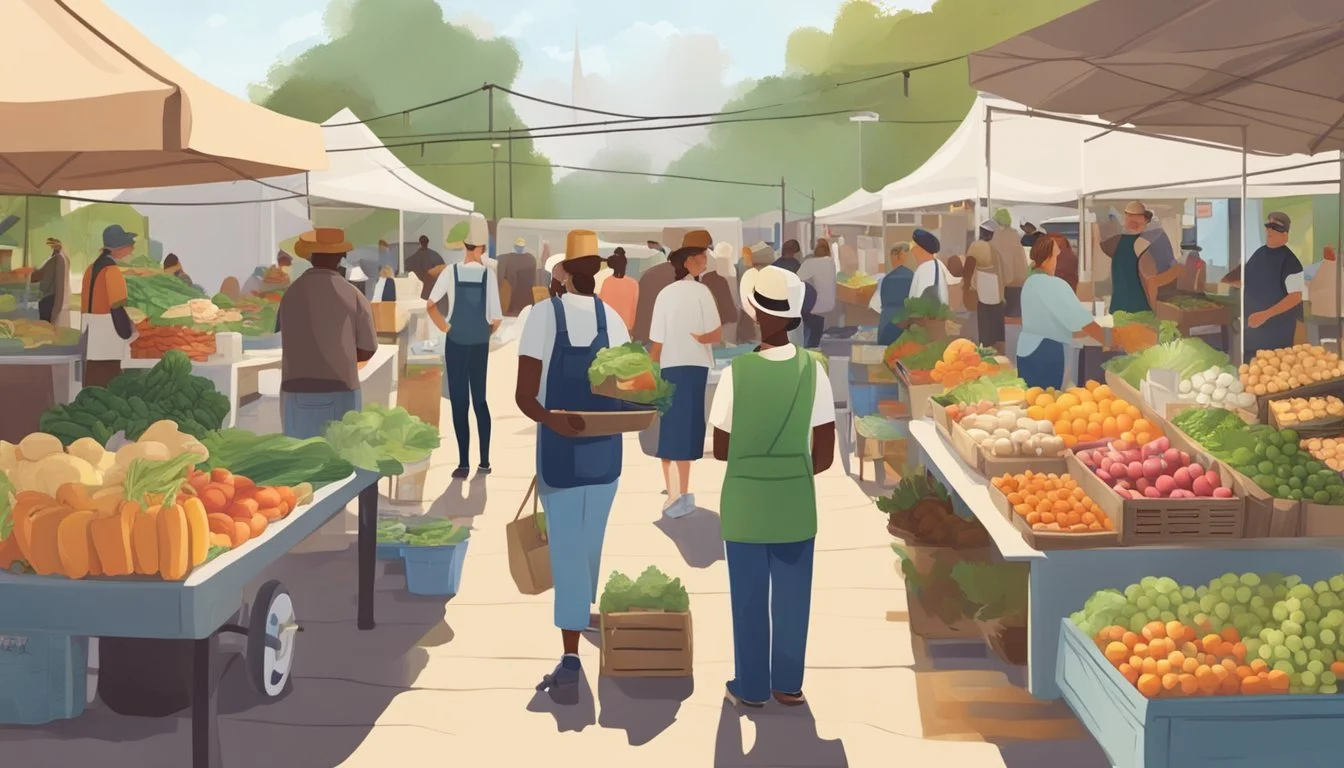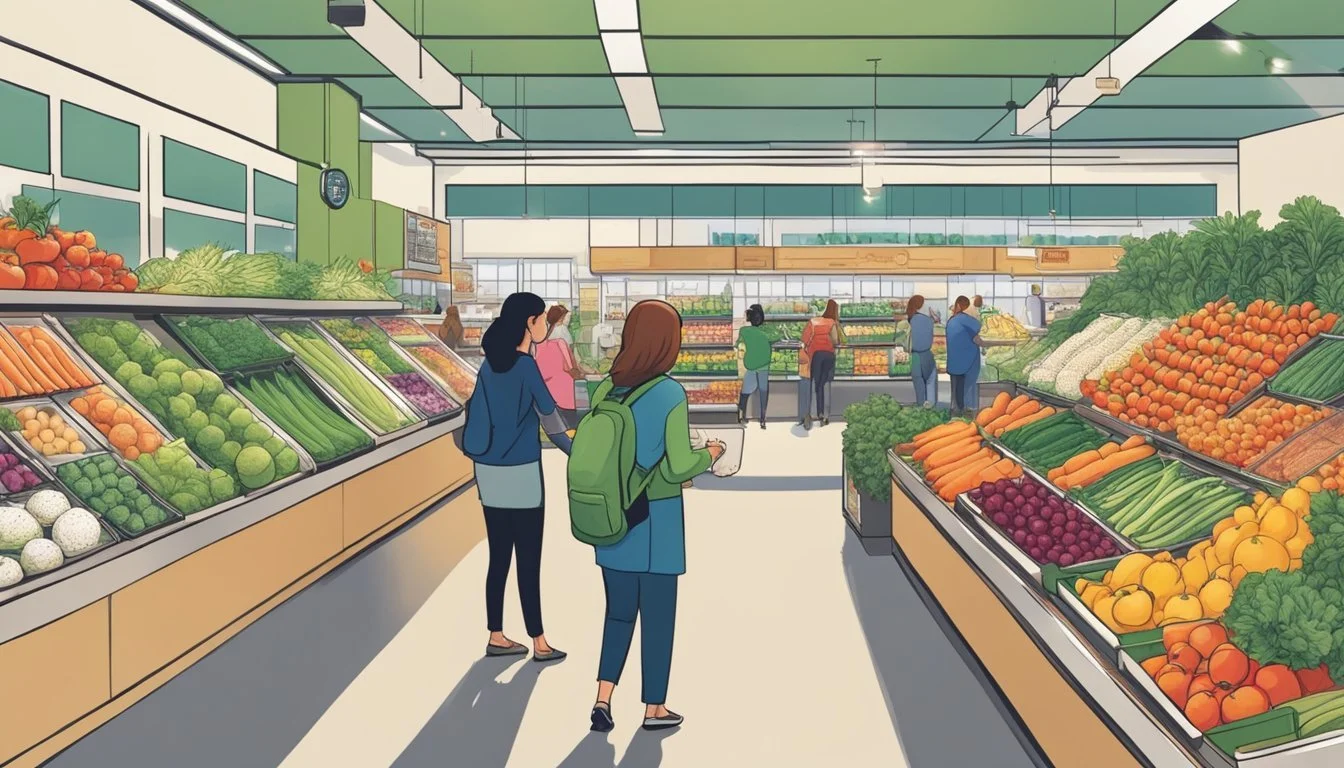Guide to Food Co-Ops in Dallas, TX
Your Essential Resource for Local, Cooperative Shopping
Food cooperatives, or co-ops, offer an alternative to mainstream grocery stores by focusing on community engagement and support for local producers. In Dallas, TX, these co-ops are a reflection of the city's diverse and growing demand for food that is not only fresh and healthy but also sustains a local ecosystem of farmers and artisans. By choosing to shop at a food co-op, consumers take part in a cycle that promotes better health, supports local economies, and contributes to a more transparent food network where decisions about product offerings are often made democratically.
The landscape of food co-ops in Dallas is shaped by a variety of establishments that cater to a wide range of culinary preferences and values. These co-ops pride themselves on stocking a diverse assortment of goods from local farms and suppliers, including grass-fed meats and pastured poultry, organic produce, local raw honey, and sustainably sourced seafood. Beyond offering high-quality and ethically produced goods, co-ops tend to be centers of education around healthy eating and sustainable living, further reinforcing their role as pillars in the community.
Many Dallas co-ops operate as either storefronts or buying clubs, providing different models of operation to suit consumer needs. While storefronts function similarly to regular retail grocery stores, buying clubs may offer a more shared approach, where members make collective purchasing decisions and enjoy the benefits of bulk buying directly from producers. This diversity in operational models contributes to a dynamic co-op scene in Dallas, ensuring that regardless of how individuals choose to shop, they have access to a food system that prioritizes community welfare, education, and quality.
What is a Food Co-op?
A food co-op is a member-owned and member-governed business that operates for the mutual benefit of all members according to common principles agreed upon by the community. They are not just a place to purchase food but a means to foster a self-reliant, self-empowering community focused on sustainable practices.
Defining the Cooperative Model
A cooperative, or co-op, is an autonomous association of persons united to meet common economic, social, and cultural needs and aspirations through a jointly-owned and democratically-controlled enterprise. In the context of food co-ops, membership is typically open to everyone, and members buy shares to provide capital for the cooperative. This structure is different from traditional grocery stores because a food co-op prioritizes the well-being of its members over maximizing profits.
Member Ownership: Every member owns a portion of the co-op.
Democratic Control: Members have an equal say in decision-making processes, often operating on a one-member, one-vote principle.
Economic Participation: Members contribute equitably to the capital of their co-op.
Benefits of Joining a Co-op
Joining a food co-op comes with multiple benefits that extend beyond mere food shopping. These are anchored in the ethical values of honesty, openness, social responsibility, and caring for others.
Community Focus: Food co-ops foster a sense of community and can become centers for local activity.
Equitable Access: They strive to provide equitable access to fresh, high-quality, and locally-sourced food.
Sustainability: Many food co-ops embrace sustainable practices such as recycling and the re-use of materials, reducing environmental impact.
Education: Co-ops often provide education about nutrition, food preparation, and the importance of a sustainable food system.
By participating in co-ops, individuals can directly contribute to and benefit from a health-focused, equitable, and community-oriented food system.
History and Evolution of Food Co-ops in Dallas
The history of food co-operatives in Dallas, Texas, is marked by community-driven efforts to provide access to wholesome, locally sourced foods. This evolution has seen both growth and challenges, reflecting a national trend towards a co-operative format of food retail.
The Beginnings in North Central Texas
In the broader North Central Texas region, food co-ops have surged as an alternative to traditional grocery shopping. The emphasis on community-oriented values and sustainable food systems spurred the formation of several food co-ops. Entities like the Cross Timbers Food Cooperative, which focused on connecting consumers to farmers within the North Central Texas area, played an instrumental role. They paved the way for a larger movement that emphasized local produce and equitable food distribution.
Dallas and Its Pioneer Co-ops
Dallas itself has been home to a variety of pioneering co-operative initiatives. Urban Acres stood out as a notable example, operating with a model that blended a traditional store with a cooperative ethos, offering Texans a range of organic and local food options. Additionally, Double Oak Food Coop emerged, promoting the idea that high-quality, sustainably produced food should be readily available and emphasizing the importance of community connectivity in the food system. This aligns with the national co-op movement, which gained momentum in the 1970s and saw local co-ops like these taking root in urban centers.
These Dallas-based co-ops thrived on the collaboration between members and producers, demonstrating a resilient model that has adapted to the times while staying true to its core principles of community service and sustainability.
Where to Find Food Co-ops in Dallas
Dallas, TX, offers a diverse range of food co-ops, catering to those seeking fresh, locally sourced groceries. From bustling central locations to quieter suburban outlets, residents and visitors alike can find wholesome food options.
Central Dallas Locations
In the heart of Dallas, Central Market is a well-known spot with a range of high-quality food selections. With its focus on fresh produce and artisanal products, shoppers are sure to find a wide array of organic and locally-sourced items. Positioned in Upper Greenville, it serves as a convenient stop for those in central Dallas.
Central Market
Location: Upper Greenville
Product Highlights: Organic produce, artisanal goods
Rating: 4.3 stars based on customer reviews
Co-ops in the Suburbs
Beyond the central city, several suburbs offer access to food co-ops emphasizing sustainability and locally grown food. For instance, Off the Farm Food located in Flower Mound, TX, provides the community with a source of healthy, clean meat since 2013. The Cross Timbers Food Cooperative, situated in Denton, brings producers and consumers together for sustainably grown food. Various suburbs like Lewisville are also home to food co-ops focusing on grass-fed and pastured meats directly from local farms.
Off the Farm Food
Location: Flower Mound
Specialty: Grass-fed and pastured meats
Distance: 25.68 miles from DallasCross Timbers Food Cooperative
Location: Denton
Focus: Sustainably grown local food
Residents in and around Arlington, Fort Worth, Richardson, North Richland Hills, Waxahachie can also venture into nearby co-ops for their daily needs, enjoying the benefits of fresh, locally sourced produce and meats.
Membership and Participation
Joining a food co-op in Dallas not only encourages healthier eating habits, but it also fosters a sense of community involvement. Members receive the benefit of fresh, local produce, and typically some level of discount, while contributing to the sustainability and self-determination of their local community.
How to Become a Member
To become a member of a Dallas food co-op, individuals usually must pay an annual membership fee. For example, one co-op requires a $50 yearly membership. Interested parties can decide between various types of shares such as full, half, or mini, based on their household size. To support individual creativity, members often don't choose specific items but receive an assortment of fresh and abundant fruits and vegetables available that week.
Roles and Responsibilities
Members of a food co-op often have roles beyond mere financial contribution. They may also have to participate in the operation of the co-op through volunteer hours or by providing input on co-op matters, reinforcing the principles of community and support. Some co-ops provide options for non-working memberships, offering varying degrees of discounts from small to traditional ones, with the latter sometimes available at a reduced rate for low-income members. Co-ops may extend sponsorships or additional discounts to support students, senior citizens, and members of other co-ops.
Local Produce and Products
Food cooperatives in Dallas place a strong emphasis on providing an inventory rich with local produce and products. These co-ops support local farms and producers, ensuring that consumers have access to fresh, sustainably grown food.
Seasonal Availability
Dallas food cooperatives take pride in offering a variety of seasonal produce. Consumers can expect to find:
Spring: A selection of leafy greens such as spinach and lettuce, and root vegetables like beets and carrots.
Summer: A bounty of berries, melons, peaches, and tomatoes.
Fall: Apples, squash, and pumpkins become abundant.
Winter: Cruciferous vegetables like kale and broccoli thrive.
The co-ops work closely with local farms to update inventory according to what is naturally available during each season.
Sourcing from Local Farms
Dallas food cooperatives are committed to sourcing from local farms. This includes:
Vegetables & Fruits: Organic produce sourced from local farms ensures minimal chemical use and supports sustainable practices.
Meat: Co-ops carry a range of pastured meats including beef, chicken, and pork. These are often obtained from farms that practice farm to fork principles, prioritizing animal welfare and quality.
By engaging with local farmers, co-ops not only promote healthier food options but also bolster the regional economy and maintain a lower carbon footprint.
Health and Nutrition
In Dallas, TX, food co-ops provide a valuable source of healthful food, prioritizing organic produce and high-quality meat and dairy products that are sourced with care for both nutrition and environmental sustainability.
Organic and Clean Food Options
Food co-ops in the Dallas area are champions of organic and clean food options. They offer a diverse selection of organic fruit and vegetables, which are not only fresher but also free from harmful pesticides and synthetic fertilizers. Consumers benefit from a direct connection to their food sources, ensuring they have access to nutritious, high-quality produce.
Organic Fruit: Apples, oranges, berries, and more, sourced from local farms.
Vegetables: A variety of leafy greens, root vegetables, and seasonal picks available.
The selection may vary by season, reinforcing the co-op's commitment to sustainability and health.
Meat and Dairy Quality
Food co-ops in Dallas also stand out for their meat and dairy quality. They offer a range of products that are not only delicious but also contribute to a healthy diet.
Meat: Includes grass-fed beef, pastured chicken, and bison. Grass-finished beef is preferred for its leaner profile and higher omega-3 content.
Dairy: Ranges from raw milk to cream, yogurt, and a variety of cheeses. These raw dairy products often come from grass-fed animals, ensuring a higher quality of milk fat and essential nutrients.
Product Type Characteristics Health Benefits Grass-Fed Meats Less total fat, more heart-healthy omega-3 fatty acids. May reduce the risk of heart disease. Pastured Eggs Higher in vitamin D, more omega-3s. Supports bone health and immune function. Raw Dairy Products More natural enzymes, potential probiotics. Can aid in digestion and overall gut health.
By prioritizing access to clean meat and healthy dairy options, Dallas co-ops ensure that their members are consuming foods that support their well-being.
Supporting Local Economy and Environment
In Dallas, Texas, food co-ops serve as a significant link between the community and local, sustainable agriculture, simultaneously bolstering the economy while preserving the environment.
Economic Impact on Local Community
Local farm co-ops and grocery cooperatives contribute significantly to the Dallas economy. They create a market for local farmers and artisans, ensuring that money spent on food stays within the community. These cooperatives operate with a commitment to genuine craftsmanship and often provide unique, locally made goods that are not available in conventional supermarkets. By choosing to shop at a food co-op, consumers directly support the livelihood of local producers and contribute to the economic stability of their community.
Environmental Benefits
Food co-ops in Dallas are not just commercial entities; they are partners in sustainability working towards a healthier planet. Local farm co-ops frequently utilize sustainable farming methods that minimize environmental impact. This includes reducing food miles by sourcing produce locally, which in turn lowers greenhouse gas emissions associated with long-distance transportation. They often offer organic options, which reduces the amount of pesticides and synthetic fertilizers entering local ecosystems. Through these practices, food co-ops help maintain the integrity of the local environment, contributing to a greener Metroplex.
Workshops and Community Events
In Dallas, a range of workshops and community events offered by food cooperatives provide education on sustainable practices and foster a robust community network. These programs emphasize simplicity, authenticity, and cooperative principles, ensuring participants gain valuable skills and insights.
Education on Sustainable Practices
Food co-ops in Dallas incorporate education at the heart of their mission. They conduct workshops that teach sustainable agriculture methods and environmental stewardship. At Cross Timbers Food Cooperative, participants can learn about the importance of sustainably grown food. Meanwhile, entities like Urban Acres offer insights into seamless integration of co-op, Community Supported Agriculture (CSA), and grocery elements, thereby educating consumers about sustainable food systems.
Building a Community Network
Creating connections within the community is fundamental to the success of food co-ops. They often host events aimed at bringing people together to learn, share, and collaborate. The Dallas Museum of Art and The Craft Guild are examples of venues where community-oriented workshops relating to food and sustainability can take place, helping to build a network where ideas and products are exchanged within a framework of trust and mutual support.
Additional Resources and Partnerships
Food cooperatives in Dallas thrive through diverse partnerships and consistent engagement with stakeholders. These collaborations are vital for accessing healthy, locally sourced products and sharing knowledge with the community.
Partner Farms and Businesses
Food co-ops in Dallas have established strong networks with local farms and businesses to provide members with a variety of fresh, ethically produced goods. Rose Creek Farms, known for sustainable practices, supplies products directly to co-ops, ensuring that members receive high-quality produce. Another partner, located in Little Elm, is recognized for its commitment to organic farming and contributes a selection of vegetables and fruits.
Co-ops also feature specialty items such as Sockeye Salmon procured from responsible fisheries, aligning with the co-op’s mission of sustainability. The partnerships extend beyond farms to local artisans and vendors who supply a curated selection of goods, from handcrafted cheeses to freshly baked bread.
Online Presence and Information Sharing
Dallas food co-ops leverage online platforms to share information and connect with members and partners. A key component of their online presence is an active Facebook page, serving as a hub for communication and updates. Co-ops use this space to:
Announce new partnerships
Highlight seasonal products
Share educational resources
The Facebook page and other digital tools help in distributing newsletters, recipes, and tips on sustainable living, fostering an informed and engaged membership base. These online resources empower consumers to make conscious dietary choices and remain informed about co-op happenings.
Future of Food Co-ops in Dallas
Food co-operatives in Dallas are anticipating growth and adaptation, driven by innovation and community involvement. They confront challenges but also see significant opportunities to reshape their contributions to the local food scene.
Innovation and New Trends
In Dallas, food co-operatives are embracing technological advances and innovative practices that promise to redefine their role in the community. Key trends include:
Local and Organic Sourcing: Dallas co-ops are increasingly focusing on locally sourced, organic produce, bolstering the regional agricultural economy and ensuring freshness for their members.
Regenerative Agriculture: Emphasis is being placed on methods that go beyond sustainability, reducing the co-op's carbon footprint and fostering soil health.
These trends align with a global shift toward more responsible consumption patterns where food co-ops can play a pivotal role in education and accessibility.
Challenges and Opportunities
Challenges faced by food co-ops in Dallas:
Market Competition: Navigating a market dominated by larger grocery entities requires strategic planning and unique value propositions.
Supply Consistency: Ensuring a steady supply of fresh, local produce can be logistically complex.
However, these challenges come with their own opportunities:
Community Engagement: Co-ops have the opportunity to deepen connections with the community through educational initiatives and participation in local events.
Donation Partnerships: Collaborations can be formed with organizations seeking donations, opening avenues for excess produce to support community needs.
Dallas food co-ops are well-positioned to not only continue serving their members with high-quality food options but also to reinforce their place as cornerstones of community development and environmental stewardship.
Customer Experiences and Testimonials
In the bustling food co-op scene of Dallas, TX, member reviews and impact stories offer invaluable insights into the benefits and experiences of community participation in local food initiatives.
Member Reviews
Members of Dallas food co-ops consistently report satisfaction with the quality of products they receive. For instance, testimonials from "Off the Farm Food" indicate that since 2013, they have enjoyed access to healthy and clean meat with a focus on locally sourced, grass-fed, and pastured options. This echoes the sentiments found in reviews of Rock Farmhouse in Haslet, where members appreciate their commitment to regenerative agriculture practices and the resulting high-quality chicken, beef, and pork offerings.
Member Feedback Co-Op Name Noted Features Positive Rock Farmhouse Regenerative practices, high-quality meats Satisfied Off the Farm Food Grass-fed, pastured meats, local sourcing
Impact Stories
Beyond individual testimonials, the broader impact stories shared by members underscore the community-building effects of co-ops in Dallas. Shoppers express gratitude towards food co-ops like "Bountiful Baskets Co-Op" for not only providing an outlet for fresh, organic produce but also for fostering a volunteer-driven environment that strengthens community ties. Similarly, "Your Health Source Co-op" has gathered acclaim for their dedication to delivering organic produce, with members lauding the co-op's role in promoting healthy living and supporting local farms.
Community Ties: Volunteers at Bountiful Baskets Co-Op are frequently thanked for their service.
Healthy Living: Your Health Source Co-op is commended for its organic produce selection and contribution to community health.
Specialized Co-op Products and Services
Dallas food co-ops cater to discerning customers by offering exclusive and wellness-focused products that are locally sourced and support sustainable practices.
Exclusive Offerings
Dallas food co-ops are known for their 100% grass-fed and pastured meats, which come from farm animals that have enjoyed the freedom to roam. For instance, Off the Farm Food in Flower Mound is committed to providing customers with healthy and clean meat, having operated since 2013.
Families who own and operate these co-ops take pride in their locally crafted dry goods. These artisans produce a variety of items that are not only unique to the area but also richer in quality due to the personalized attention to detail.
Health and Wellness Products
Several Dallas co-ops offer products like Ultra Cell CBD Oil which cater to the growing demand for health and wellness merchandise. These products are extensively vetted to ensure they align with the cooperative's commitment to health, quality, and sustainability.
In addition to specialized products, these co-ops provide a sense of community and shared values, as they often embrace family-owned values and prioritize the well-being of both the consumer and the environment.





